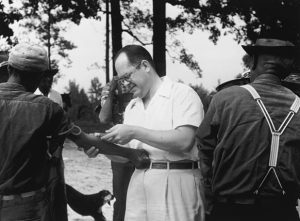Distrust Doctors ??

Multiple studies over an extended period of time confirm what most doctors and providers already knew, African Americans are more likely to distrust doctors and other healthcare providers than patients of other racial or ethnic groups.
What many of us did not know was why. As providers, we spent many years training to help others. Medicine is a service profession. Why would anyone suspect our intentions, question our motives, or assign us collectively as untrustworthy? The answer lies in the historical experience African Americans had with America’s doctors, hospitals, and researchers.
A History of Abuse
While the Tuskegee Syphilis Study is a ‘classic example’ of abuse based purely on race, unfortunately, the American experience has many more examples of why African Americans mistrust the medical community.
From African American’s earliest days in this country, abuse based on race was commonplace. Slaves were frequently used as subjects for dissection, surgical experimentation, and medical testing. J. Marion Sims, MD, the so-called father of modern gynecology perfected many of his surgical techniques on slave girls without anesthesia. Stories of doctors kidnapping and killing southern blacks for experimentation consistently appear in literature throughout American history.

As Vanesa Northington Gamble, MD, PhD put in her article “Under the Shadow of Tuskegee: African Americans and Health Care” tales of ‘medical student’ grave robbers, recount the exploitation of southern blacks as their deceased family members would be stolen and sent to northern medical schools for anatomy dissection. Dr. Gable writes:
“These historical examples clearly demonstrate that African Americans’ distrust of the medical profession has a longer history than the public revelations of the Tuskegee Syphilis Study. There is a collective memory among African Americans about their exploitation by the medical establishment.”
Racial Differences in Trust
Chanita Hughes Halbert published a study in JAMA in 2006 looking at racial differences in trust in healthcare providers. Her study of almost one thousand white American and African American patients found that “compared with whites, African Americans were most likely to report low trust in health care providers.”
“Trust has been described as an expectation that medical care providers (physicians, nurses, and others) will act in ways that demonstrate that the patient’s interests are a priority. Trust is a multidimensional construct that includes perceptions of the health care provider’s technical ability, interpersonal skills, and the extent to which the patient perceives that his or her welfare is placed above other considerations. Trust is an important determinant of adherence to treatment and screening recommendations and the length and quality of relationships with health care providers.”
Fortunately, the level of trust a patient has for any specific provider is not stagnant, it can be earned. Increased exposure to providers in general, and to the same provider in specific, has been shown to improve trust.
Physician Bias
In the “Medscape Internist Lifestyle Report 2017”, Carol Peckham looked at internist’s admitted explicit biases “toward specific types or groups of patients” and found wide differences between racial groups in bias for a number of influences. The study further examined if the physician bias actually impacted care delivery, and almost one in five providers (18%) admitted that their bias did impact the quality of their care.
Generally these biases are positive toward white American patients and negative toward African American patients as a study by Oliver et al demonstrated at the University of Virginia. They found providers explicitly preferred white Americans to African Americans with “significantly higher feelings of warmth toward white people” and also found that white American patients were “more medically cooperative than African Americans”. This study found no significant difference in the quality of care between the racial groups.
Unconscious Bias
Biases that effect medical care can be consciously counteracted, and admitting the existence of biases is the critical first step in canceling its effect on medical care. Having a doctor who professes to treating “everyone the same” will undoubtedly provide inferior care to patients that are different.
A study done at Johns Hopkins by Lisa Cooper and colleagues found that primary care physicians who hold unconscious racial biases tend to dominate conversations with African-American patients during routine visits, paying less attention to patients’ social and emotional needs, and making these patients feel less involved in decision making related to their health. These patients also reported reduced trust in their doctors, less respectful treatment, and a lower likelihood of recommending the physician to a friend.
Because there are a limited number of physicians to provide care to African Americans, many patients simply “put up” with biases and unequal treatment . . . with others avoiding healthcare altogether until they they arrive in Emergency Departments with very advanced disease.
Patient Centered Care Improves Quality
Patient centered care can positively improve care, specifically for African Americans. Although this seems obvious, spending time with patients is an easy approach to establishing trust. Fiscella and colleagues measured patient trust against the time spent with a patient and found a one-to-one correlation: the more time spent led to more perceived trust on the part of the patient. Making suggestions about diet changes requires a trusting relationship that involves a non-judgmental regard for the current diet.
Many delays in diagnosis and treatment are simply an outgrowth of the lack of trust. You will not accept someone’s advice if you don’t trust them.
Find a physician you trust.








